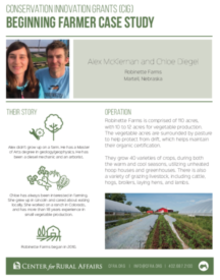- Alex didn’t grow up on a farm. He has a Master of Arts degree in geology/geophysics. He has been a diesel mechanic and an arborist.
- Chloe has always been interested in farming. She grew up in Lincoln and cared about eating locally. She worked on a ranch in Colorado, and has more than 18 years experience in small vegetable production.
- Robinette Farms began in 2010.
Operation
Robinette Farms is comprised of 110 acres, with 10 to 12 acres for vegetable production. The vegetable acres are surrounded by pasture to help protect from drift, which helps maintain their organic certification.
They grow 40 varieties of crops, during both the warm and cool seasons, utilizing unheated hoop houses and greenhouses. There is also a variety of grazing livestock, including cattle, hogs, broilers, laying hens, and lambs.
Mission statement
Robinette Farms seeks to sustainably produce a diversity of high-quality farm goods for sale locally. We strive to build a profitable business that minimizes off-farm inputs, reduces our detrimental impact on the environment, and educates our community about the food we eat and enjoy. Through hard work and managed, sustainable growth, we intend to create a farm that supports our family and community for generations to come.
EQIP
Robinette Farms has used the Environmental Quality Incentives Program (EQIP) for a high tunnel. They have looked into expanding fencing and water development using the program, but have not started an application.
Advice to beginning farmers
"The best education you can get will come from another farmer. Each aspiring and beginning farmer should spend 3 to 5 years working for someone else before starting their own farm. Every farm is specialized, and every market is different." -Alex McKiernan
Risk management
"Our community-supported agriculture (CSA) serves as a form of risk management—it is a guaranteed payment." -Alex McKiernan
End goal
Alex and Chloe’s overall goal is to have a profitable business so their children will want to take over someday. Alex defines a successful business as, “dynamic, creative, and makes money.”
Read more about Alex and Chloe on our blog.
This material is based upon work supported by the Natural Resources Conservation Service, U.S. Department of Agriculture, under number 69-3A75-17-46. Any opinions, findings, conclusions, or recommendations expressed in this publication are those of the author(s) and do not necessarily reflect the views of the USDA. USDA is an equal opportunity provider and employer.


